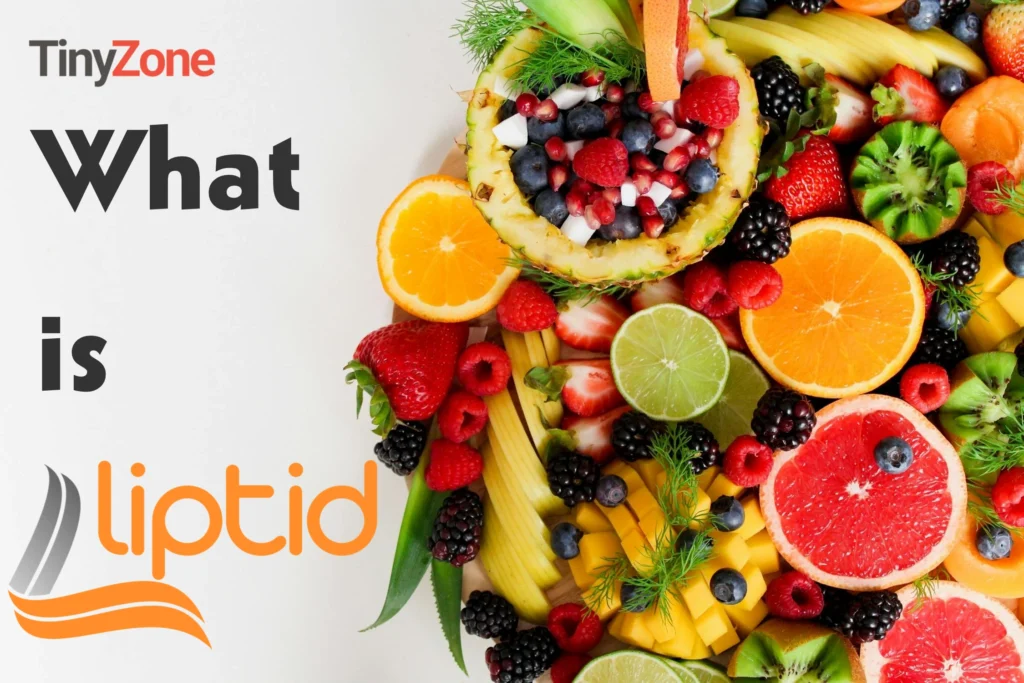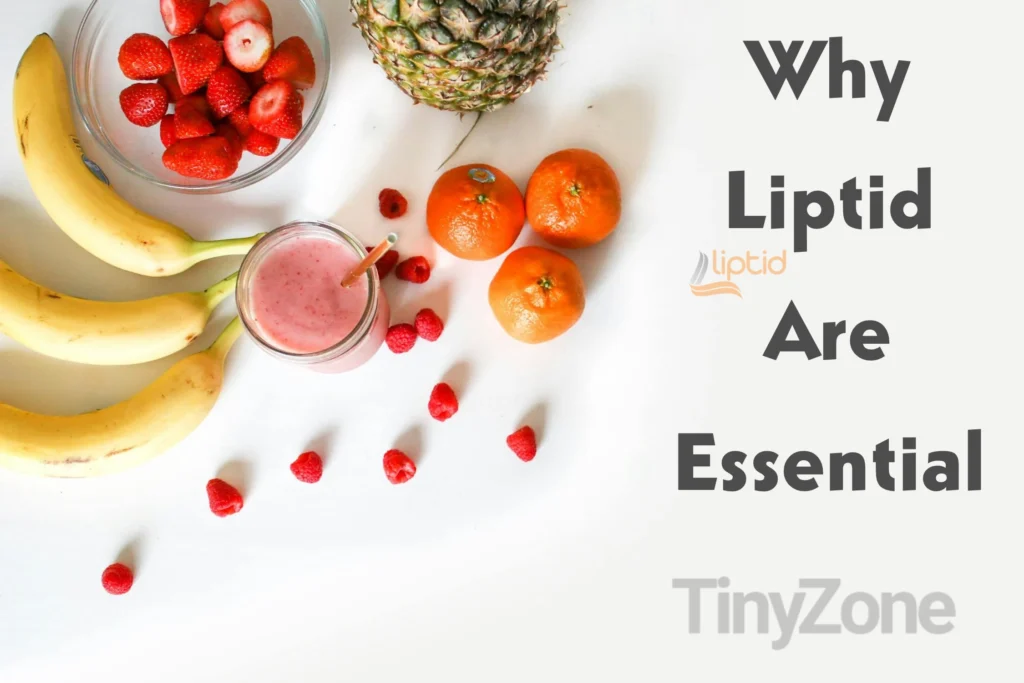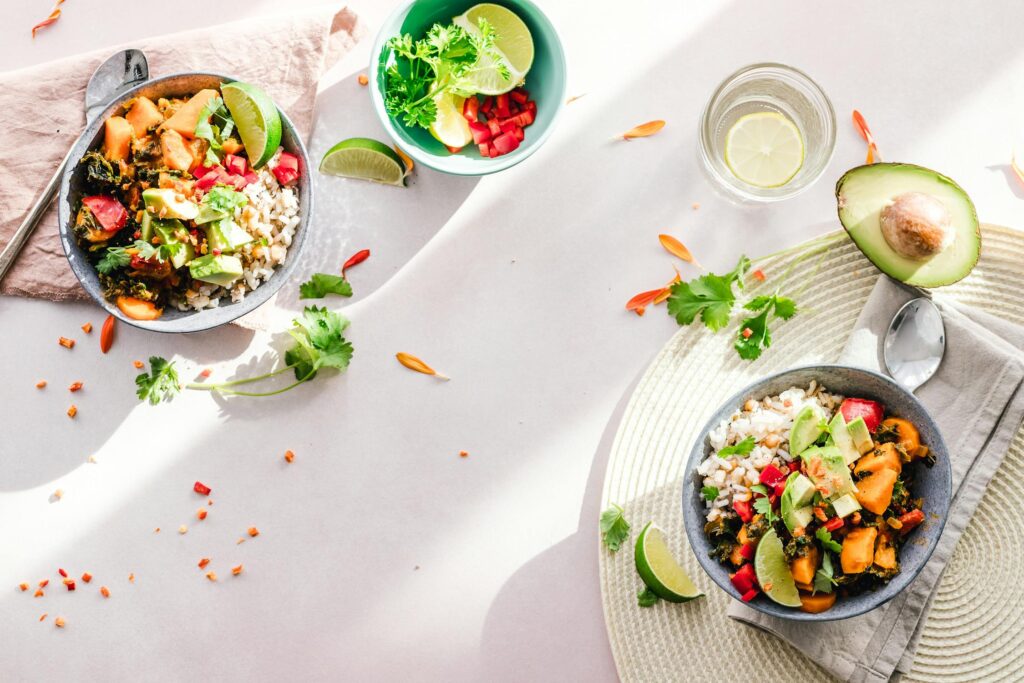Liptid – What is Liptid? Learn Liptid Role In Health

Have you heard about Liptid? It’s a term that is becoming more popular in talks about nutrition and health. Even though it might not be the first thing that comes to mind when you think about healthy eating, understanding Liptid can really change how you think about your diet. This knowledge can help you improve digestion, absorb nutrients better, and enhance your overall health. Let’s explore a closer look at what Liptid is all about and why it matters in our daily lives!
What is Liptid?

Liptid refers to special compounds found in many foods that are important for our health. These compounds are mainly fat-based, which means they are a type of nutrient that our bodies need for many functions.Unlike simple sugars or proteins, Liptid serves as a source of energy and helps our bodies absorb important vitamins. Additionally, Liptid plays a role in producing hormones and keeping our cell membranes healthy. This shows that Liptid is not just about providing energy; it also affects many processes in our bodies.Liptid can be grouped into several types: saturated fats, unsaturated fats, and trans fats. Each type has different effects on our health. Understanding these types can help us make better choices about what we eat.
There are three main types of Liptid:
- Triglycerides
- PhosphoLiptid
- Sterols
Each type has specific roles in the body and can be found in different food sources.
Type of Liptid Main Function:

TriglyceridesEnergy storage and insulation Phospholipids
Building cell membranesSterolsHormone production and maintaining cell structure
1. Triglycerides: The Most Common Liptid
Triglycerides are the most common type of Liptid in the human body and in food. They consist of three fatty acids attached to a molecule of glycerol. These fats are a major source of energy for the body and are stored in fat tissues for later use.
Types of Fatty Acids in Triglycerides
Triglycerides are made up of different types of fatty acids:
- Saturated Fatty Acids: Found in animal products and some plant oils. These fats are typically solid at room temperature.
- Unsaturated Fatty Acids: Found in foods like nuts, seeds, and fish. These fats are usually liquid at room temperature.
- Monounsaturated Fatty Acids: Found in foods like olive oil and avocados.
- Polyunsaturated Fatty Acids: Found in fatty fish, walnuts, and sunflower oil.
- Trans Fatty Acids: Found in processed foods, often in partially hydrogenated oils. These are considered unhealthy and should be avoided.
Type of Fatty AcidFoods Where They Are FoundSaturated Fatty AcidsButter, cheese, red meat, coconut oilMonounsaturated Fatty AcidsOlive oil, avocados, almondsPolyunsaturated Fatty AcidsSalmon, walnuts, flaxseedsTrans Fatty AcidsFried foods, baked goods, margarine
2. Phospholipids: The Cell Builders
Phospholipids are responsible for building and maintaining cell membranes. They are unique because they have a water-loving (hydrophilic) side and a water-repelling (hydrophobic) side. This characteristic helps them form the structure of cell membranes, which protect the cells and regulate what goes in and out.
Where Phospholipids Are Found
Phospholipids are not as commonly discussed as triglycerides, but they are found in many foods:
- Egg Yolks: Rich in lecithin, a type of phospholipid that contributes to brain health.
- Soybeans: Contain phospholipids that are often extracted for supplements.
- Organ Meats: Such as liver and kidney, which are nutrient-dense.
- Fish: Fatty fish like salmon and mackerel are good sources.
- Sunflower Seeds: Contain phospholipids and healthy fats.
Food SourcePhospholipid ContentEgg YolksHigh in lecithin, which supports brain and liver healthSoybeansPopular source for phospholipid supplementsFishProvides phospholipids along with omega-3 fatty acidsOrgan MeatsRich in essential fats and phospholipids Sunflower SeedsGood source of phospholipids and healthy fats
3. Sterols: Supporting Hormones and Health
Sterols are another type of Liptid that are important for hormone production and cell structure. The most well-known sterol is cholesterol, which is crucial for making hormones like estrogen, testosterone, and cortisol. Cholesterol is also needed to make vitamin D and bile acids, which help digest fats.
Types of Sterols
- Cholesterol: Found in animal-based foods like meat, eggs, and dairy.
- Plant Sterols (Phytosterols): Found in plant-based foods like nuts, seeds, and vegetable oils. These can help reduce cholesterol levels in the body.
Foods Rich in Sterols
- Animal Sources:
- Eggs: Contain cholesterol, essential for hormone production.
- Dairy Products: Such as milk, cheese, and yogurt.
- Meat: Especially organ meats like liver.
- Plant Sources:
- Nuts and Seeds: Almonds, walnuts, and sunflower seeds are rich in plant sterols.
- Vegetable Oils: Like olive oil and canola oil.
- Legumes: Beans and lentils also contain plant sterols.
Type of Sterol Foods Where They Are Found
CholesterolEggs, meat, dairy productsPlant SterolsNuts, seeds, vegetable oils, legumes
How to Balance Liptid Intake in Your Diet?

Maintaining a balance of different types of Liptid is essential for overall health. Too much of one type and too little of another can lead to health problems. Here are some tips to help you balance your Liptid intake:
- Include Healthy Fats: Focus on foods that provide unsaturated fats, such as avocados, nuts, seeds, and fatty fish.
- Limit Saturated Fats: Reduce intake of foods like butter, fatty meats, and full-fat dairy products.
- Avoid Trans Fats: Check food labels and avoid products that contain partially hydrogenated oils.
- Incorporate Plant Sterols: Add nuts, seeds, and vegetable oils to your meals to lower bad cholesterol levels.
- Cook Smart: Use cooking methods like grilling, baking, or steaming instead of frying to reduce unhealthy fat intake.
TipWhy It HelpsInclude Healthy FatsSupports heart and brain healthLimit Saturated FatsReduces risk of heart diseaseAvoid Trans FatsPrevents cholesterol build-up in arteriesIncorporate Plant SterolsHelps lower bad cholesterol levelsCook SmartReduces intake of unhealthy fats
Insights from Experts
Nutrition experts emphasize the importance of understanding the role of Liptid in our diet. Here are some expert quotes and insights:
- “Not all fats are bad. The key is to focus on healthy fats that nourish the body while limiting harmful ones like trans fats.” – Dr. Emily Carter, Dietitian.
- “Liptid are essential for more than just energy. They play a role in brain function, hormone production, and even immune health.” – Dr. Michael Lewis, Nutritionist.
- “Incorporating a variety of Liptid sources, including plant-based options, can help maintain a healthy balance.” – Sarah Johnson, Health Coach.
Why Liptid Are Essential?

Liptid are more than just fats; they are vital for many processes in the body. From providing energy to supporting brain health and hormone production, Liptids are essential for life. By understanding the types of Liptid and where to find them, you can make informed food choices that support your health and well-being.Eating a variety of foods that provide triglycerides, phospholipids, and sterols ensures that your body gets the nutrients it needs. Remember, balance is key. Too much or too little of any one type of Liptids can lead to health problems. By following simple tips and focusing on whole, nutrient-dense foods, you can enjoy the benefits of Liptid while maintaining good health.
The Role of Liptid in Digestion and Nutrient Absorption

Liptid is very important for how our bodies digest food. It helps break down fats and makes it easier for our bodies to absorb them.
This is essential for getting fat-soluble vitamins like A, D, E, and K.When we eat foods rich in Liptid.
Our bodies use bile acids to break down these fats into smaller pieces.
This process makes it easier for our bodies to digest and use the fats.Additionally, Liptid helps keep our gut healthy.
A healthy gut is important because it prevents nutrient deficiencies and supports overall wellness.
When we have enough Liptid in our diets, our bodies can efficiently produce energy from the fats we eat.
If we do not get enough Liptid, it can be hard for our bodies to process nutrients properly.
In details the Role of Liptid in Digestion and Nutrient Absorption

Liptid plays a vital part in how our bodies digest food and absorb nutrients. It is a key player in breaking down fats and enabling our bodies to use them effectively. Understanding how Liptid works in digestion can help us make better food choices that support our health.
How Liptid Aids Digestion?

When we eat foods that contain fats, Liptid helps in breaking them down. Fats are not easily digestible on their own. They need a process to become small enough for our bodies to absorb. Here’s how Liptid aids in this process:
- Bile Production: The liver produces bile, a fluid that helps digest fats. When we eat, bile is released into the small intestine. Liptid interacts with bile to emulsify fats, making them easier to digest.
- Emulsification: Emulsification is the process of breaking down fats into tiny droplets. This increases the surface area of the fats, allowing digestive enzymes to work more effectively.
- Absorption: After emulsification, the body absorbs the smaller fat particles through the intestinal walls. This process is crucial for using the energy and nutrients stored in fats.
Importance of Fat-Soluble Vitamins
Liptid is essential for absorbing certain vitamins known as fat-soluble vitamins. These vitamins include vitamins A, D, E, and K. Here’s why they matter:
- Vitamin A: Important for vision and immune function. It helps keep our skin and eyes healthy.
- Vitamin D: Supports bone health by helping the body absorb calcium. It also plays a role in immune health.
- Vitamin E: Acts as an antioxidant, protecting our cells from damage. It supports skin health and immune function.
- Vitamin K: Essential for blood clotting and bone health. It helps prevent excessive bleeding.
Without sufficient Liptid in our diets, our bodies may struggle to absorb these important vitamins, leading to deficiencies.
How Liptid Supports Gut Health
A healthy gut is crucial for overall well-being. Liptid contributes to gut health in several ways:
- Intestinal Lining: The intestinal lining is a barrier that protects the body from harmful substances. Healthy fats help maintain the integrity of this lining, preventing leaks that can lead to inflammation and other issues.
- Nutrient Absorption: A healthy gut lining allows for better absorption of nutrients. Liptid supports the cells in the intestinal lining, ensuring they function properly.
- Gut Microbiome: The gut microbiome consists of beneficial bacteria that aid digestion. Healthy fats can help nourish these bacteria, promoting a balanced gut environment.
The Connection Between Liptid and Energy Production

Liptid is a major source of energy for our bodies. When we consume fats, our bodies convert them into energy through a series of processes:
- Fat Breakdown: Once absorbed, fats are stored in the body. When energy is needed, these fats are broken down into smaller molecules.
- Energy Conversion: The body converts these smaller molecules into usable energy. This process occurs mainly in the mitochondria, the powerhouses of our cells.
- Sustained Energy: Because fats are calorie-dense, they provide a steady source of energy, making them important for prolonged physical activities.
Tips for Enhancing Liptid Intake
To make sure you are getting enough Liptid for digestion and absorption, consider these tips:
- Include Healthy Fats: Add sources of healthy fats to your meals. Foods like avocados, nuts, olive oil, and fatty fish can boost your Liptid intake.
- Balance Your Diet: Aim for a balanced diet that includes a variety of food groups. This helps ensure you get all the necessary nutrients.
- Cook Wisely: Use cooking methods that preserve healthy fats. Baking, grilling, or steaming are better choices than frying.
- Read Labels: Pay attention to nutrition labels when buying packaged foods. Look for healthy fats and avoid trans fats as much as possible.
- Stay Hydrated: Drinking plenty of water helps with digestion and supports nutrient absorption. Adequate hydration is important for overall health.
Expert Insights on Liptid
Experts in nutrition highlight the importance of Liptid in our diets. Here are some notable quotes and insights:
- “Healthy fats are essential for our bodies to function properly. They support digestion, absorption, and overall health.” – Dr. Emily Johnson, Nutritionist.
- “Without sufficient Liptid, our bodies cannot absorb vital vitamins or maintain a healthy gut.” – Dr. Michael Lee, Gastroenterologist.
- “Incorporating a variety of healthy fats into your diet can help you achieve better health and well-being.” – Sarah Thompson, Dietitian.
The Impact of Liptid on Overall Health

The role of Liptid in digestion and nutrient absorption goes beyond just breaking down fats. It impacts our overall health in several ways:
- Weight Management: Healthy fats can promote a feeling of fullness, which may help with weight management. This can prevent overeating and support a balanced diet.
- Heart Health: Consuming the right types of Liptid can promote heart health by managing cholesterol levels. Unsaturated fats, in particular, can lower bad cholesterol and raise good cholesterol.
- Brain Function: Omega-3 fatty acids, found in fatty fish, are important for brain health. They support cognitive function and may reduce the risk of cognitive decline.
- Hormonal Balance: Healthy fats are also important for hormone production. They help regulate hormones that control mood, energy levels, and metabolism.
Common Sources of Liptid in Our Diet
Liptid is found in many everyday foods, which makes it easy to include in our diets. Here are some common sources of healthy fats:
- Avocados: Packed with monounsaturated fats, which are great for heart health.
- Nuts: Almonds, walnuts, and other nuts are high in healthy fats and provide vitamins.
- Olive Oil: A great source of monounsaturated fats, perfect for cooking or dressing salads.
- Fatty Fish: Salmon and mackerel are rich in omega-3 fatty acids, which support brain health.
- Dairy Products: Cheese and yogurt contain healthy fats and help with gut health.
- Seeds: Chia seeds and flaxseeds are also excellent sources of healthy fats.
Incorporating these foods into your meals can help ensure you get enough Liptid for your body to function well.
Effects of Too Much or Too Little Liptid
Having too much Liptid can lead to health problems. When consumed in large amounts, it may result in weight gain because Liptid is high in calories. A diet high in Liptid can also raise cholesterol levels, increasing the risk of heart disease and other serious issues. It is important to pay attention to how much Liptid you eat.On the other hand, not getting enough Liptid can also be harmful. Lack of essential fatty acids can hurt brain health, as these fats are crucial for maintaining cognitive function. Not enough healthy fats can also affect hormone production and skin health, leading to dryness or imbalances over time. Finding the right balance is key to staying healthy.
Tips for Keeping Your Liptid Intake Balanced
To maintain a good balance of Liptid in your diet, consider these tips:
- Mix Up Your Foods: Include a variety of foods that contain healthy fats, such as nuts, seeds, and avocados. These can be great snacks or additions to meals.
- Watch Your Portions: Healthy fats are still high in calories, so it’s important to be mindful of how much you eat. A small amount of olive oil or a handful of nuts can go a long way.
- Read Labels: When shopping for packaged foods, check the nutrition labels. They often show the type and amount of Liptid in the product, helping you make better choices.
- Choose Healthy Cooking Methods: Instead of frying, try baking, grilling, or steaming your foods. These methods can help you keep Liptid levels in check while still enjoying tasty meals.
- Stay Informed: Keep learning about healthy fats and their importance in your diet. The more you know, the better choices you can make for your health.
Conclusion
Liptid is an important part of our diets and has a big impact on our overall health. It is essential for digestion and helps us absorb important nutrients. There are many sources of Liptid in our everyday foods, from avocados to fatty fish.However, it is crucial to find the right balance. Too much or too little Liptid can lead to health issues that affect our energy, metabolism, and even our mood. By learning how to balance Liptid intake, you can make better choices for your diet.As we navigate the world of food today, understanding the importance of Liptid will help us create healthier eating habits. By including healthy fat sources in our meals and keeping an eye on our intake, we can take advantage of the benefits that Liptid offers. This knowledge can help us live healthier lives and improve our overall well-being.
